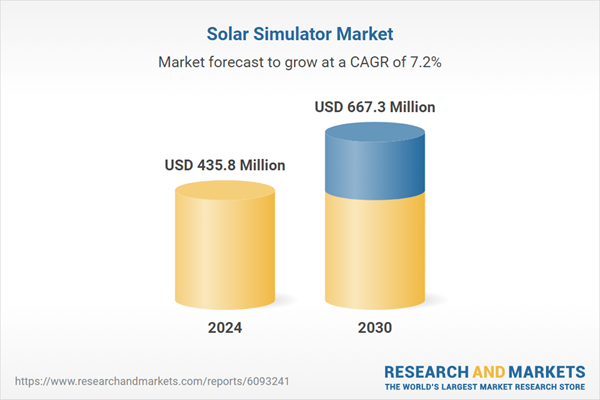Speak directly to the analyst to clarify any post sales queries you may have.
10% Free customizationThis report comes with 10% free customization, enabling you to add data that meets your specific business needs.
Ongoing technological advancements, including the transition from xenon to energy-efficient LED-based systems, are enhancing simulator accuracy and durability. These innovations support evolving PV technologies such as bifacial and perovskite cells. Increasing regulatory standards and the need for high-quality testing are also pushing manufacturers to adopt advanced Class AAA simulators. Furthermore, automation and data analytics integration are improving operational efficiency, supporting market expansion across PV manufacturing and research sectors.
Key Market Drivers
Rising Demand for Solar Photovoltaic (PV) Systems and Increasing Investment in Renewable Energy
The growing global emphasis on clean energy, supported by favorable policies and environmental concerns, is propelling demand for solar PV systems and, in turn, solar simulators. These devices are essential for testing and calibrating solar modules under controlled light conditions. Government-backed initiatives, such as tax incentives and renewable energy targets, are accelerating solar capacity development in countries including China, India, the U.S., and several European nations. As solar panel production rises to meet this demand, manufacturers increasingly depend on simulators for accurate and standardized quality checks. This heightened focus on renewable energy infrastructure directly strengthens the solar simulator market by making performance validation a critical part of solar technology deployment.Key Market Challenges
High Initial Investment and Operational Costs
A key restraint in the solar simulator market is the high upfront and operational costs associated with advanced simulation equipment. High-performance Class AAA simulators require precise engineering, high-grade materials, and advanced calibration to comply with standards like ASTM E927 and IEC 60904. These specifications drive up procurement and maintenance expenses. For smaller manufacturers, academic institutions, and research labs - particularly in developing regions - the capital investment required can be prohibitive. Additionally, these systems often demand controlled environments and skilled operators, further adding to their total cost of ownership. This financial barrier restricts broader accessibility and limits market penetration among cost-sensitive users.Key Market Trends
Shift Toward LED-Based Solar Simulators for Enhanced Accuracy and Efficiency
A key trend transforming the solar simulator market is the move from traditional xenon and metal halide lamps to LED-based systems. LEDs offer greater spectral control, energy efficiency, and operational longevity, making them ideal for testing advanced PV technologies like bifacial and perovskite solar cells. Unlike xenon lamps, which require frequent replacement and suffer from spectral instability, LEDs deliver consistent output for over 10,000 hours with minimal maintenance. They also enable precise spectral tuning to replicate solar conditions more accurately in accordance with AM1.5G standards. These benefits are encouraging widespread adoption of LED-based simulators in both commercial manufacturing and research settings.Key Market Players
- ABET Technologies, Inc.
- Avalon ST
- Newport Corporation
- SunSolar Technology Co., Ltd.
- Holmarc Opto-Mechatronics Ltd.
- HANBIT-METIS Co., Ltd.
- SAN-EI ELECTRIC CO., LTD.
- Steuernagel Lichttechnik GmbH
Report Scope:
In this report, the Global Solar Simulator Market has been segmented into the following categories, in addition to the industry trends which have also been detailed below:Solar Simulator Market, By Type:
- Steady State
- Pulsed
Solar Simulator Market, By Application:
- PV Cell Module & Material Testing
- UV Testing of Materials & Products
- Automotive Testing
- Biomass Study
- Others
Solar Simulator Market, By Light Source:
- Xenon Arc Lamp
- Metal Halide Arc Lamp
- UV Lamp
- QTH Lamp
- LED Lamp
Solar Simulator Market, By Region:
- North America
- United States
- Canada
- Mexico
- Europe
- Germany
- France
- United Kingdom
- Italy
- Spain
- Asia Pacific
- China
- India
- Japan
- South Korea
- Australia
- South America
- Brazil
- Colombia
- Argentina
- Middle East & Africa
- Saudi Arabia
- UAE
- South Africa
Competitive Landscape
Company Profiles: Detailed analysis of the major companies present in the Global Solar Simulator Market.Available Customizations:
With the given market data, the publisher offers customizations according to a company's specific needs. The following customization options are available for the report.Company Information
- Detailed analysis and profiling of additional market players (up to five).
This product will be delivered within 1-3 business days.
Table of Contents
Companies Mentioned
- ABET Technologies, Inc.
- Avalon ST
- Newport Corporation
- SunSolar Technology Co., Ltd.
- Holmarc Opto-Mechatronics Ltd.
- HANBIT-METIS Co., Ltd.
- SAN-EI ELECTRIC CO., LTD.
- Steuernagel Lichttechnik GmbH
Table Information
| Report Attribute | Details |
|---|---|
| No. of Pages | 186 |
| Published | June 2025 |
| Forecast Period | 2024 - 2030 |
| Estimated Market Value ( USD | $ 435.8 Million |
| Forecasted Market Value ( USD | $ 667.3 Million |
| Compound Annual Growth Rate | 7.2% |
| Regions Covered | Global |
| No. of Companies Mentioned | 8 |









